| Article ID | Journal | Published Year | Pages | File Type |
|---|---|---|---|---|
| 2927392 | Indian Heart Journal | 2016 | 7 Pages |
BackgroundDiabetes is a metabolic disorder characterized by enhanced production of free radicals hence oxidative stress. The aim of this study was to evaluate the activity of cardiac and antioxidant enzymes in diabetic and non-diabetic acute myocardial infarction (AMI) patients.MethodsThis case–control study was conducted on 450 subjects (70–85 years). Subjects were divided into three groups (Normal, N; Non-diabetic AMI, N-AMI; and Diabetic AMI, D-AMI). Each individual was subjected to a detailed history, clinical examination, and cardiovascular parameters analysis (fasting blood sugar, HbA1c, systolic and diasystolic blood pressure, total cholesterol (TC), triglycerides (TG), low-density lipoprotein (LDL), high-density lipoprotein (HDL), TC/HDL and LDL/HDL ratios). Cardiac markers (Troponin-I, creatine phosphokinase (CPK), creatine kinase-MB (CK-MB), lactate dehydrogenase (LDH), C-reactive protein (CRP) and aspartate aminotransferase (AST)) and oxidative stress markers (superoxide dismutase (SOD), malondialdehyde (MDA), glutathione (GSH), catalase (CAT)) were also assessed. All these parameters were compared between diabetic and non-diabetic AMI patients.ResultsD-AMI individuals had high level of TC, TG, LDL, and low level of HDL in comparison to N-AMI individuals. Study suggests that cardiac markers such as Troponin I, CPK, CK-MB, AST, LDH, and CRP levels were significantly increased in patients suffering from myocardial infarction with diabetes mellitus (DM) compared to patients of myocardial infarction without DM. The activity levels of antioxidant SOD and GSH were lower in D-AMI patients than in N-AMI. However, levels of MDA and CAT were higher in D-AMI than in N-AMI controls.ConclusionStudy suggests elevated cardiac markers and reduced antioxidants in D-AMI patients compared to N-AMI patients.
